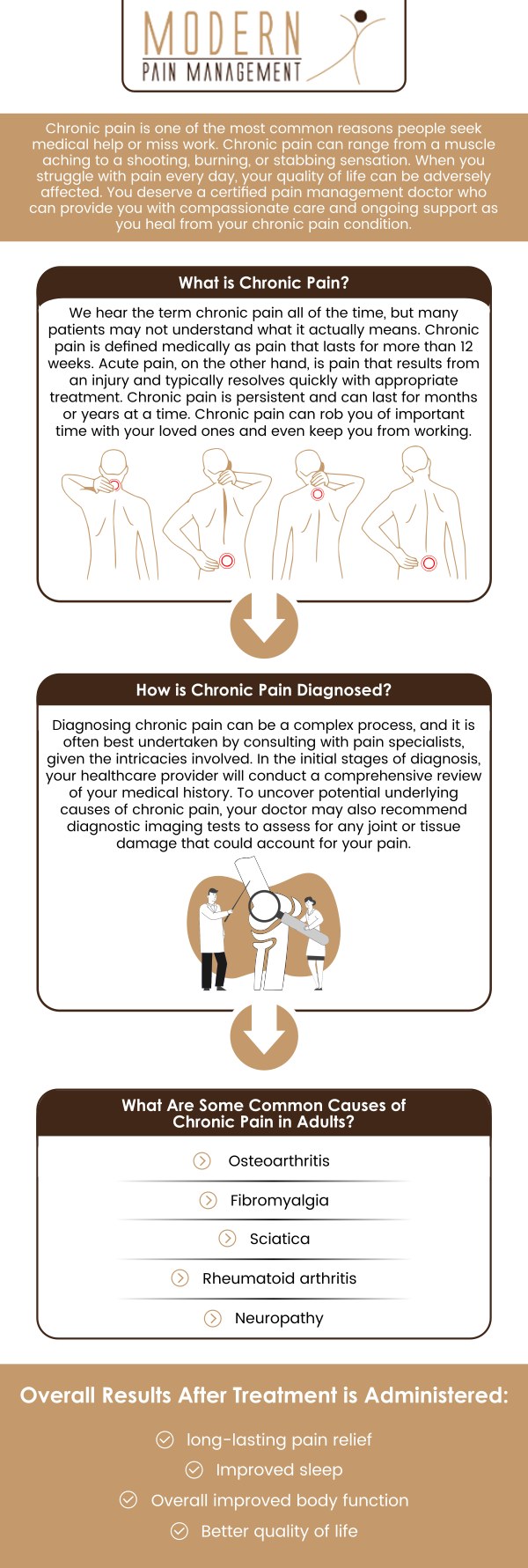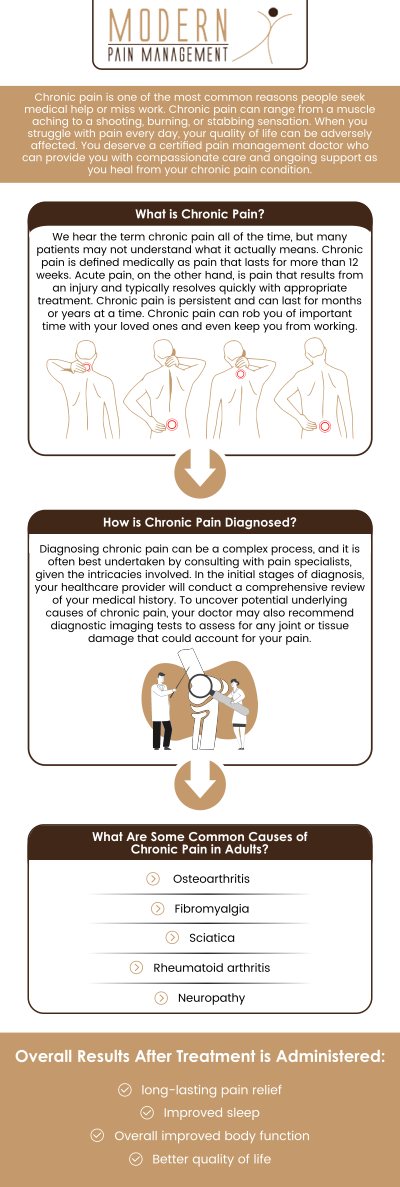Chronic Pain: What Is It and What You Can Do About It
Chronic pain, a persistent discomfort lasting weeks, months, or years, can disrupt daily life. Our comprehensive approach combines personalized care and treatment options, offering relief tailored to your needs. Discover solutions for chronic pain with Dr. George Atallah, DO, and his team at Modern Pain Management. Explore how our team can help you recover and improve your quality of life. We have convenient locations to serve you in Houston TX, and Sugar Land TX. For more information, please contact us or book an appointment online. Take control of your chronic pain and reclaim your well-being with us.




Table of Contents:
What is the difference between chronic pain and other pain?
Where do people have chronic pain?
What tests are used to diagnose chronic pain?
What are the complications of chronic pain?
Chronic pain is a type of pain that continues for a prolonged period, usually lasting for more than three months. It is different from acute pain, which is typically because of an injury or illness and heals as the body heals. Chronic pain, however, may be caused by an underlying medical condition, such as arthritis, fibromyalgia, or nerve damage, and can be more complex to manage.
Chronic pain can be categorized into two types – nociceptive and neuropathic pain. Nociceptive pain is due to harm done to body tissues, such as muscles, bones, and organs, and is often described as aching or throbbing. Neuropathic pain, on the other hand, is caused by damage to the nerves themselves and is often described as burning, shooting, or stabbing.
Chronic pain can play a huge part in someone’s quality of life, interrupting their ability to work, socialize, and complete daily routines. It can also lead to depression, anxiety, and other mental health issues. Therefore, it is essential to manage chronic pain effectively, which may involve a combination of medication, physical therapy, counseling, and lifestyle changes.
Chronic pain can occur anywhere in the body, and the location of the pain can be different based on the underlying cause. It may be localized to one area, such as the back, neck, or joints, or it can be widespread, affecting multiple areas of the body. Some people may experience chronic pain in their muscles, while others may have nerve pain or a combination of both.
Common conditions that can cause chronic pain include arthritis, fibromyalgia, chronic fatigue syndrome, neuropathy, back pain, migraines, and cancer. Chronic pain can also be caused by injuries, such as whiplash or a sports injury, or as a result of a surgical procedure.
Just remember that chronic pain is a complicated condition, and treatment will depend on the underlying cause and the individual’s specific needs. Therefore, if you are experiencing chronic pain, it is imperative to meet with a healthcare professional to decide on the best course of action.
Diagnosing chronic pain can be challenging as it varies from person to person. There isn’t a single test that can verify the presence of chronic pain. However, your doctor may conduct several tests to help determine the underlying cause of your pain and develop an appropriate treatment plan.
One of the first tests your doctor may recommend is a physical examination. During this examination, your doctor will evaluate your symptoms, such as the location, duration, and intensity of your pain. They may also look for any signs of inflammation, muscle weakness or atrophy, or other physical abnormalities.
Your doctor may suggest blood tests to check for signs of infection, inflammation, or other unknown medical issues that could add to your pain. X-rays, CT scans, and MRIs could be used to visualize the affected area and identify any structural abnormalities or injuries.
Nerve conduction studies and electromyography (EMG) may also be useful in identifying nerve damage or dysfunction that may be causing your pain. These tests show how much electrical activity is in your nerves and muscles to help your doctor determine the extent and severity of any nerve damage.
Overall, diagnosing chronic pain requires a comprehensive evaluation that goes over your medical past, symptoms, and test outcomes. By finding the underlying reasons behind your pain, your doctor can develop an effective treatment plan that addresses your specific needs and helps improve your quality of life.
Chronic pain can have several complications, both physical and emotional. It can leave you with depression, anxiety, and other mental health issues. Chronic pain can also affect a person’s ability to perform daily activities, which can result in social isolation and a decreased quality of life. Additionally, chronic pain can cause fatigue, sleep disturbances, and decreased appetite, which can further exacerbate the physical and emotional toll of the condition.
Experience relief and renewed vitality with the compassionate team at Modern Pain Management. Let us guide you on the path to recovery from chronic pain, restoring your ability to live life to the fullest. You can take the first step toward a pain-free future by scheduling your consultation today. We have convenient locations to serve you in Houston TX and Sugar Land TX. For more information, please contact us or book an appointment online. We serve patients from Houston TX, Sugar Land TX, Pearland TX, Jersey Village TX, Missouri City TX, Stafford TX, and Richmond TX.
Check Out Our 5 Star Reviews

ADDITIONAL SERVICES YOU MAY NEED




